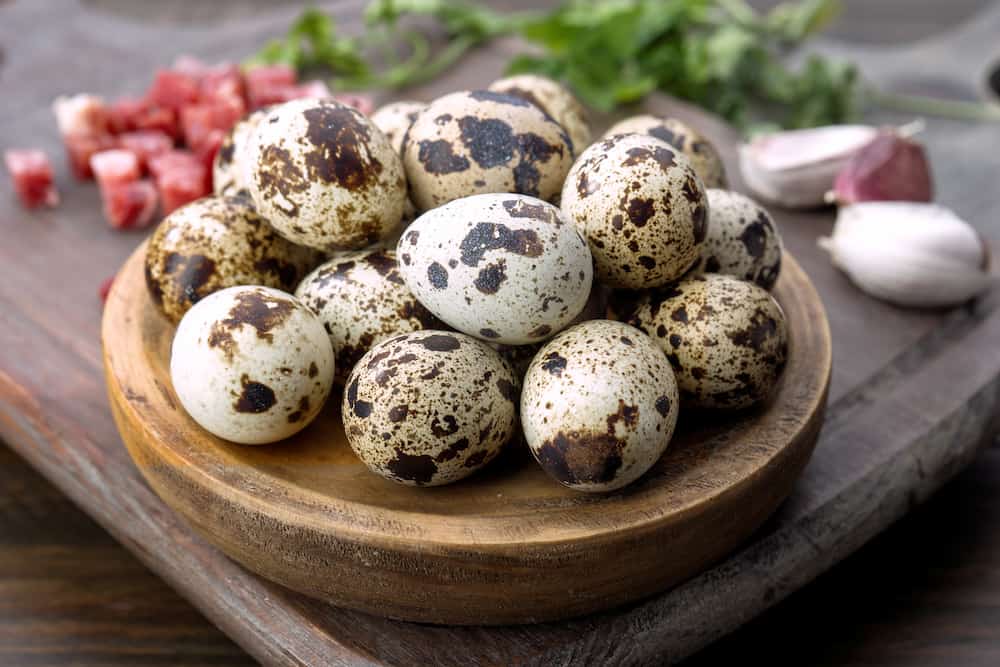Quail eggs may be a lot smaller than chicken eggs, but I think they have a great taste. Raising quail for their eggs may be an option for you if you live in an area without a lot of space.
If you live in a city where keeping chickens isn’t allowed, or just don’t have space for larger birds, keeping quail is a fantastic alternative. They are often permitted in areas that don’t allow chickens.
What are Quail Eggs?
They say good things come in small packages. That certainly rings true when it comes to the quail egg or codorniz eggs. They are perfectly edible, small eggs and are more common in some parts of the world than others. Often they are considered a delicacy, especially in Europe, Asia, and North America.
They taste like chicken eggs, but are richer and have a higher yolk-to-egg-white density.
I have fried, poached, and hard boiled quail eggs. I use them the way I do chicken or duck eggs. They are great to add to make savory sauces and other recipes. The difference is you’ll need more of them to equal typical egg recipes.
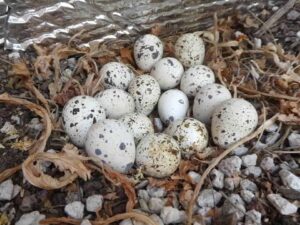
What Do Quail Eggs Look Like?
The quail egg has the same shape as chicken eggs, but as you’d expect from a smaller bird, it’s smaller in comparison. The quail egg size is roughly the same as a large olive and, for this reason, makes a great addition to a buffet table, canape platter, or charcuterie board.
Coturnix quail eggs are 10 – 14 grams. Jumbo Coturnix quail eggs will be slightly larger.
In terms of quail egg’s shell color, it’s cream or off-white with irregular brown and black speckles all over. Quail eggs look like malted milk balls but in an egg shape.
Inside, it looks the same as any other egg, and its larger yolk to egg white ratio is obvious as soon as the egg is out of its shell.
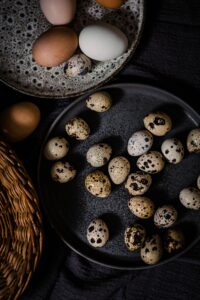
Are Quail Eggs Expensive?
Typically, quail eggs are $6 – $7 per dozen. My Costco sells them now. Keep in mind, they are smaller eggs, so they can be considered expensive at approximately 50 cents per egg. This makes them more expensive than organic chicken eggs.
I haven’t done this but many people who raise quail sell their eggs. It would be interesting to know if now that Costco sells them, this is worth their while… They aren’t as “rare” and “exclusive” as they used to be.
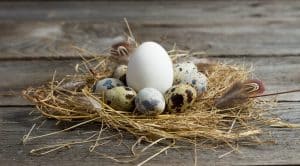
Quail Eggs vs Chicken Eggs
As I said, quail eggs are smaller than chicken eggs. You can use the insides similarly: in savory dishes; poach; hard boil; fry; scramble; and use in baking.
Four or five quail eggs equal one chicken egg. You can substitute them for chicken eggs in baking and cooking.
Collecting Quail Eggs
Quail are ground birds. Unlike chickens, they prefer to nest on the ground, much like ducks do. Because quails tend not to lay their eggs in nest boxes, you may have trouble finding them.
Finding the eggs on your property when the quails have some space to free-range means you should get to know your birds. As you get to know the hens, you’ll find some may lay in the same spot. Others will not. This means it’s important for you to be able to find them all.
Their eggs are brownish and small which often makes it difficult to spot them in the straw, hay, alfalfa, or in the grass.
If you are raising quail in cages, be sure to choose a cage with a built-in tray. These will have a slant in order for the eggs to roll out of the cage.
It will prevent the quails from damaging the eggs and also keep them cleaner. These set-ups make collecting quail eggs easy.
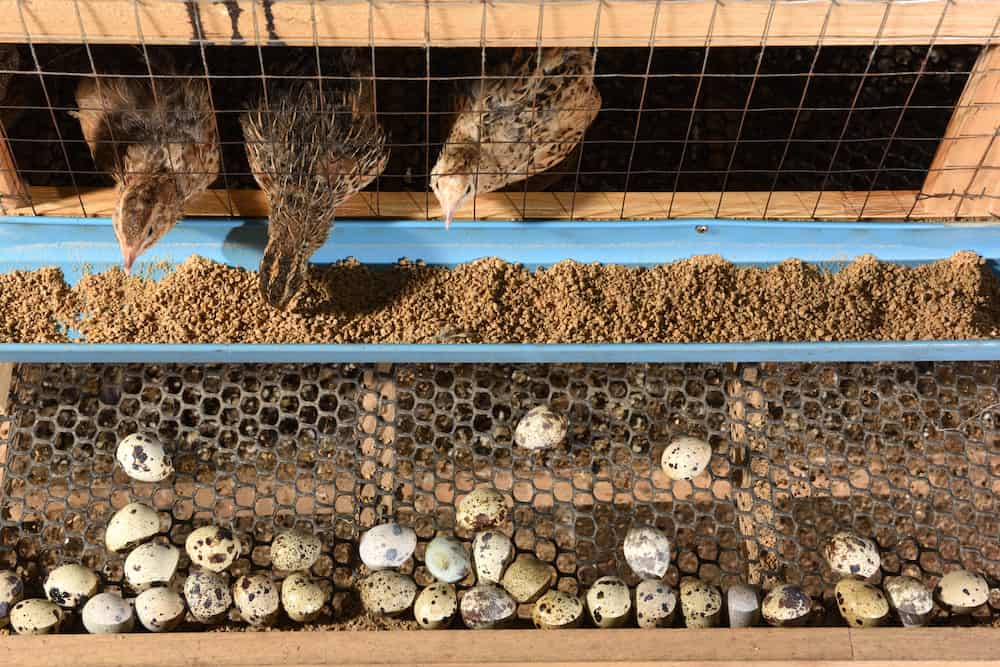
FAQs
1. Are Quail Eggs Expensive?
Per dozen, quail eggs are more expensive than chicken eggs. Being smaller as well, they are more expensive per ounce. Until Costco started selling them, my opinion is they used to be difficult to find, making them more of a luxury and more expensive. In the past, I could only find them in specialty grocery stores. They would cost around $6 for a dozen. Food costs have skyrocketed though, and Costco sells them for less.
2. How Long Do You Cook a Quail Egg?
With their small egg size, it will cook faster than a chicken eggs. This means cooking time should be reduced. If you’re boiling them, submerge them in boiling water for just two minutes. Then, remove them from the boiling water. Next, run the eggs under cold water to stop the cooking process.
If you have an abundance, you can use quail eggs in baking. One chicken egg equals five quail eggs. You could also use a kitchen scale to be more precise. You may also find you need to add a minute or two onto the cooking time due to the heftier yolk to egg white ratio.
3. How Long Do Quail Eggs Last?
Try to eat them within a month of them being laid. However, food safety standards say that they are good for around six weeks. That said, make sure you keep them refrigerated below 40 degrees.
4. How Often Do Quail Lay Eggs?
Some quail breeds like the Japanese quail will reliably lay one egg per day, but most breeds fall very slightly short of that.
5. How Many Eggs Do Quail Lay?
Quails are known as being prolific layers, with many breeds averaging around 300 eggs per year. In comparison, ducks only produce around 180 eggs per year, but of course, they are far bigger than quail eggs.
6. How Long Does it Take for a Quail Egg to Hatch?
Typically, quail eggs take 17 – 23 days to hatch, depending on the breed. Hens aren’t broody so you’ll need to incubate them yourself. Keeping up with a steady cycle of hatching eggs means you can breed more birds.
This is ideal if you wish to collect eggs and then have the birds for meat. You may also want to consider selling chicks.
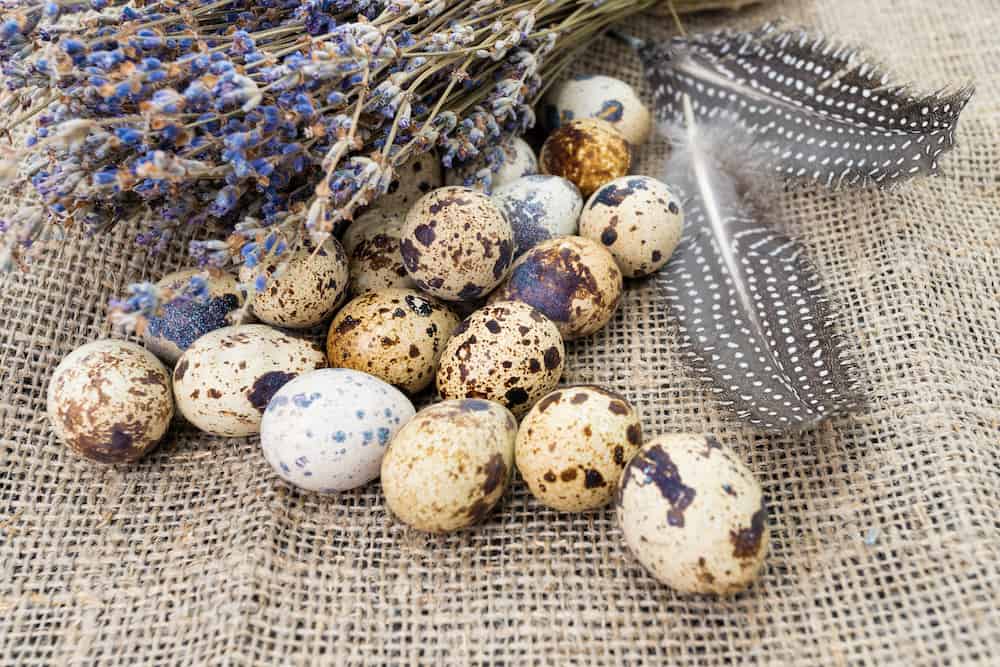
Ready Supply of Eggs
Eggs from quail are increasing in popularity. There are many quail egg recipes. The trouble will be finding them in the grocery store if you don’t live near Costco or have a Costco membership.
Comparing quail eggs to turkey eggs and duck eggs vs chicken eggs, they are much smaller.
If you are considering raising poultry, it’s important to consider their size. In addition to their eggs being smaller, quails are also smaller than turkeys, ducks, and chickens, making them easy to keep.
One option for a steady supply of eggs is raising these small birds. It can be a fantastic choice for people lacking backyard space. If you live in a city or town, maybe the choice has already been made for you due to local legal restrictions.
You can also consider the profit should you sell their eggs because quails are reliable producers and will produce for a long period.
Quails are beautiful, quiet birds that many people enjoy keeping for their eggs, meat, and company. They should provide a steady supply of eggs.
Consider raising them if you are looking for birds that are easy to care for. They are ideal for hobby farms and backyard farms because they are small, low maintenance, and provide food.

